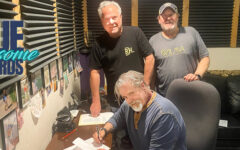
 As a bluegrass disc jockey and retailer, I have noticed an epidemic within our beloved bluegrass community.
As a bluegrass disc jockey and retailer, I have noticed an epidemic within our beloved bluegrass community.
A plague threatens the growth of young listeners into mature fans, this virus called “Albumitis!”
Albumitis-n.- a glaring musical gap between Flatt & Scruggs’ Greatest Hits and Dailey & Vincent Sing The Statler Brothers in adolescent bluegrass fans’ collections
It’s sad but true, but many bluegrass “converts” are missing out on some terrific bluegrass albums which we take for granted. For this reason, and out of the goodness of my heart, I will begin presenting an Album of the Week column in order to fight this dread disease.
Each week, I will showcase an album which I feel is critical for any mature bluegrass fan. My only criteria will be that the album is at least five years old. I will also do my best to only choose albums which are still available. I will note at the bottom if the album is available, and if so, where the album can be acquired (i.e. iTunes, Music Shed, Classic Country Connection, County Sales, CD Baby, etc.).
Some of the albums will be classics which deserve a reminiscent look. Others may be lesser known albums, with which some of you may not be as familiar, but are still quite good when it comes to expanding our Bluegrass Worldview.
 For this first Album of the Week, I am going to stick with one of my favorites: Tony Rice’s Church Street Blues.
For this first Album of the Week, I am going to stick with one of my favorites: Tony Rice’s Church Street Blues.
Church Street Blues was released in 1983. To put it in perspective, Cold On The Shoulder was released in ’84. In my opinion, this album is all too often overlooked. It is his first solo project after having formed The Tony Rice Unit in 1978. When I say this album is a solo project, it is exactly that. The only other artist on the album is Rice’s brother, Wyatt. This is the first album on which Wyatt recorded, and he plays rhythm on four tracks. All other work is just Tony and his guitar.
One reason this one of my favorites is because of the recording’s intimacy. You get the feeling that Rice is picking at his favorite local coffeehouse for a bunch of friends. It’s like you become closer to Rice as a person with every note that is sung or played.
The song selection on this album is particularly rich. There are only three instrumental pieces, with the rest of the songs showcasing Rice’s vocals. Although many of the tunes are more folk-oriented in nature, there are still a few standards. The instrumental pieces are Cattle In The Cane and two of the most beloved Monroe fiddle tunes, Gold Rush and Jerusalem Ridge.
There is also an outstanding cover of Jimmie Rodgers’ Any Old Time. The tune has been covered by numerous artists, including Webb Pierce, Doc & Merle Watson, Alison Krauss, and Jimmy Gaudreau & Moondi Klein. Rice’s guitar work on the song may seem simple compared to his mind-boggling work on others, but it is a perfect match to Rodgers’ song, and leaves more room for Rice’s vocals to shine.
Rice’s friend, Norman Blake, penned two of the tunes: Orphan Annie, as well as the title track. Both of the songs are beautifully constructed, and fit Rice’s vocal style like a glove. Church Street Blues may be the most well known recording from the album. Rice’s performance of the song, both vocally and instrumentally, are nothing short of inspiring.
A beautiful rendition of Tom Paxton’s Last Thing on My Mind is also found on this gem of an album. Porter and Dolly’s duet rendition was a hit in 1967, but nearly everyone has tried their hand at this number including Charley Pride, Flatt & Scruggs, Chet Atkins, Doc Watson, Johnny Cash, Anne Murray, The Dillards, and more. Rice’s version really stands out, because of how privately he interprets the song. The listener feels as if Rice made a personal dedication before the song started, but it was left on the production room floor. You will believe every note of this song.
A special favorite of mine is Rice’s version of House Carpenter. It is one of the oldest and most beautiful English ballads familiar to bluegrass. The song tells the tale of an unfaithful wife succumbing to temptation, and abandoning her husband and child. After hearing the tune, it’s easy to understand how the song has lasted for centuries. Tom T. Hall once said that a key to writing a good song is making sure the melody is simple enough the average man can hum it. The simplicity and catchiness of the song in both tune and lyric has helped it stand the test of time. Rice’s haunting rendition of the song will be stuck in your head all day. It is one of the staple performances on the album.
Other songs on the record include Streets of London, One More Night, Pride of Man, and a classic by Rice’s favorite songwriter, Gordon Lightfoot: Wreck of The Edmund Fitzgerald.
The cohesiveness of all the songs, along with their tastefully simple arrangements cause the album to flow quite nicely. Although the entire record runs short of forty minutes, there is not one thing I would add to this hidden masterpiece by the great Tony Rice.
Church Street Blues is a Sugar Hill release, and is still widely available. You can purchase the album on iTunes, as well as through Music Shed, County Sales and the Classic Country Connection.
Come back next week as I highlight the rare album, The Goins Brothers Sing The Hits of The British Invasion!
Have a Happy Thanksgiving everybody.







